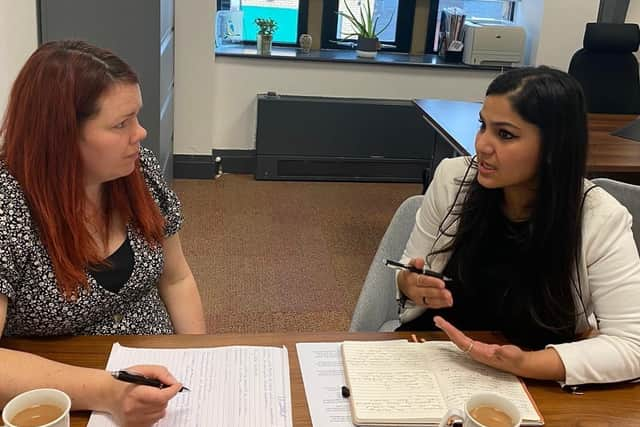Hamara in South Leeds has dished up culinary treats for groups during lockdown


Hamara, the largest ethnic minority organisation in the voluntary and community sector in Leeds, has been providing meals to a range of different communities like Asian, Roma and Caribbean.
The organisation, which is well versed in helping people overcome a myriad of problems, has seen the demand for food grow during lockdown.
Advertisement
Hide AdAdvertisement
Hide AdShanaz Gul, Hamara’s operations director said: “Prior to Covid, due to the nature of our work, we are used to crisis management. We have run a foodbank for over five years in partnership with FairShare.


“Pre Covid we were serving 30 families per week. We have been serving 30 per day during Covid. In addition, we have also provided approximately 7,000 hot meals since March 30.”
As well as its work in South Leeds for the Community Care Volunteering initiative, Hamara has also been a cultural hub across the city. It has ensured different communities have received culturally appropriate food. Shanaz added: “Prior to purchasing any food, I consulted with lots of different community leaders to discuss which kinds of food should be in these parcels. We have got different parcels: South Asian, African, Caribbean, Roma, Polish and Middle Eastern. We put together packs for each different ethnicity, which go out to organisations as well as individuals. At the minute we provide 130 to 150 food parcels a week, which is a mixture of individuals who are known to us and people who turn up on the door daily. The need and demand is increasing daily as well.”
It received an initial grant of £26,000 from Leeds City Council to run the cultural hub. Hamara also supported local shops in South Leeds by buying £10,000 worth of supplies from them. But it has also had to source food from wholesalers further afield as demand soared.
Advertisement
Hide AdAdvertisement
Hide AdBut food is just one aspect of its work. Last Monday, 24 people who were new to Hamara turned up at its Beeston base. They had heard about its support services through word of mouth.


Shanaz said they could provide a wrap around service for people needing help with a range of issues like benefits, housing and mental health. It also runs a patient ambassadors scheme with GPs in East Leeds, like the Bellbrooke Surgery. The initiative works on a holistic approach, which looks at the whole person and their problems to overcome barriers. There have been numerous success stories in helping people’s well being, and the scheme is now expanding into South Leeds.
There have been many examples of how working together during the pandemic has speeded up the process of helping people. Shanaz said one shining example is Helen Binns, the project manager at Leeds City Council’s Families First Team who has helped them solve numerous problems and to source an electric van to help Hamara to do its food deliveries.
Shanaz said: “I think Covid-19 has been the ultimate test for managers and leaders across the globe. Being decisive is key. I feel really proud to be part of a vibrant third sector in Leeds right now.
Advertisement
Hide AdAdvertisement
Hide Ad“Leeds’s response has been phenomenal for our city. We have worked collaboratively to beat the crisis and serve the communities.”


She added: “Covid has broken down barriers, people are listening, taking on our feedback and responding very quickly.”
BACKGROUND:
Hamara was established in 2002.
It is named after the Urdu word for ‘our’. The healthy living centre evolved out of the South Leeds Elderly Group (SLEG).
But the Beeston based initiative now provides information, advice and guidance, day services, training, employment and education, youth activities, sport, health and exercise services.
Advertisement
Hide AdAdvertisement
Hide AdIts work is underpinned by the five ways to well-being theory: be active, stay socially connected, take notice and be mindful, have the ability to learn, and finally think about giving back, like your time or sharing your skills.
Shanaz Gul, its operations director, said: “We started as a small office with two part-time staff as the elders project and we have now grown as an ethic minority organisation in the voluntary and community sector of Leeds, based in the heart of Beeston on Tempest Road.
“We are not a South Asian organisation, specifically, just for Asian people. We work predominantly across the city and with lots of different ethnicities.”
Its face-to face meetings have had to stop as many of its members are disproportionately affected by Covid, but it has moved activities online and outdoors to keep people safe. These include going for walks, gardening and family bubble activities in parks.
For more information see: www.hamara.org.uk or ring 0113 277 3330.